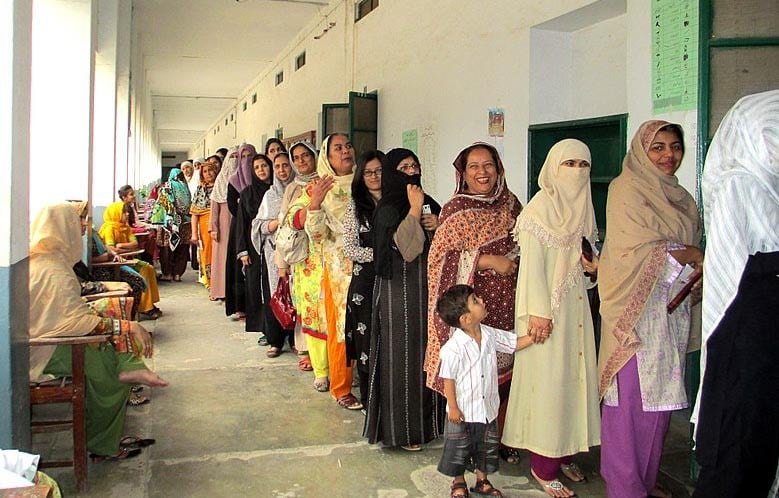
The Elections Act 2017 is a significant step in ensuring turnout of women voters in backward areas

It was May 11, 2013. The Paikhel Union Council in Mianwali was host to an unusual activity. Most of the locals had never seen women come to the polling station to caste their vote in general elections. Before this day, polling stations were no-go areas for female voters.
Women in this area were disenfranchised in 1963 when the tribal elders decided that they would not step out of their house on the election day. The reason, according to the locals, was that women standing in queues and open to public view was against their traditional values.
It took 50 years and endless negotiations with the people of Mianwali by different quarters, including government representatives, women rights activists, etc, to cancel this written agreement. This was possible only after the approval of the direct descendents of the tribal elders who had imposed this ban.
In the by-elections for the Punjab Assembly seat in PP-23 of Talagang, Chakwal, Punjab, on April 18, 2017 not a single vote was cast by 11,128 registered women voters in 17 polling stations - because, reportedly, women had been barred from voting by the notables of the area. But there was no way to prove this. Men said women had decided themselves to refrain from voting.
These are just two out of many examples where women voters have refrained from voting under written or unwritten agreements.
The Election Commission of Pakistan (ECP) has not been able to act effectively against this practice due to legal hurdles. For example, it declared elections in PK-95, a constituency in Khyber Pakhtunkhwa (KP), null and void in May 2015 for the reason that none of the 53,000 registered women voters had cast their votes. It ordered a re-election but the decision was overturned by the Peshawar High Court. Because, there was no law on this and the complainants, as the court observed, were NGO activists, not the affectees.
An important development is that the parliament enacted the Elections Act 2017. The law prescribes that if the turnout of women voters is less than 10 per cent of the total votes polled in a constituency, the ECP may presume that women voters have been restrained through an agreement from casting their votes and may declare polling at one or more polling stations or election in the whole constituency, void.
The law states, "the presiding officer shall prepare a gender disaggregated statement of voters showing total number of men and women voters at the polling station and the total votes cast by men and women voters. Besides, he/she shall send the gender disaggregated statement of voters to the returning officer and to the Commission at the time of communication of result to the returning officer and the Commission."
The law also warns against any attempts at coercing women officers. It states, "The Presiding Officer may, at any stage on the polling day during or after the polling, prepare and send a special report to the Returning Officer and to the Commission if he has reason to believe that women voters have been restrained from exercising their right to vote based on any express or implied agreement. The Election Commission may order filing of complaint under this Act before a court of competent jurisdiction against persons who entered into such agreement."
On the significance of this legislation, Fauzia Viqar, Chairperson, Punjab Commission on Status of Women (PCSW), says it will help the cause of making more women part of the democratic process though there is a need to further improve it.
"For an election to be valid under this law, at least 10 per cent of the votes cast in a constituency should be cast by women whereas some people think this condition should be applicable on every polling station because it is possible to have 10 per cent share of the total votes cast in a constituency with many polling stations without a single vote cast by women," she adds.
Viqar says even in the past many such agreements were applicable on women living in the jurisdiction of a couple of polling stations or villages and not the whole constituencies. "So, there should be the condition of 10 per cent women’s vote at every polling station."
She adds, "this legislative measure has sent a message to all that forcing women not to vote will no more be tolerated by the state and those who are part of such agreements will be punished." She says PCSW will be monitoring elections in Punjab and inform the Election Commission about any violations they observe. The other provinces will have their own arrangements.
"PCSW will also have the support of respective district administrations in case it needs to counter any move by locals to stop voting by women any time before the elections," she adds. She hopes the situation will improve because candidates will not want their efforts and election spending to go waste due to low turnout of women voters. "They will themselves ensure that women voters turn out in required numbers."
The difference now is that nobody will have to prove such allegations and simply the numbers will speak. Usual explanations and justifications by locals for low turnout of women workers will not work.
Read also: Editorial
Looking back, one recalls, Malik Yar Khan, Chairman, Union Council, Dhurnal, District Chakwal said that women prefer to stay inside because they fear clash among rival groups if somebody stares at them or misbehaves with them on the election day.
Mumtaz Hussain, Executive Director, Center For Health and Gender Equality (CHANGE), terms prohibiting women from voting against the spirit of the International Covenant on Civil and Political Rights and the Convention on the Elimination of All Forms of Discrimination (CEDAW). "Pakistan is a signatory to these and, therefore, must ensure that women have the right to participate in the electoral process," he says.